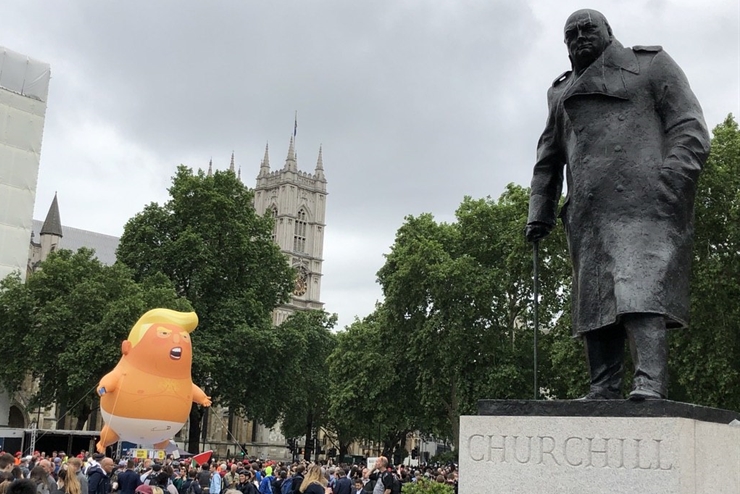“Covering American politics is like crack,” a veteran British journalist told me last year. “Once you’ve had a taste nothing else gives the same high.”
I now think I know what he meant—though LSD might be a more apt comparison. In the age of Trump, it’s hard to watch American politics without wondering if you are hallucinating. I know a lot of Americans feel the same way.
Looking at November’s presidential election, the British are in different ways baffled, amused, and alarmed. People in London now often ask, in a tone of incredulity, “He’s going to do it again isn’t he?” To lots of Brits the fact that the 45th president might be reelected strikes them as mad. They have been told by a reliably anti-American mainstream British media that Trump is an orange-skinned white supremacist who is destroying the world order and killing people with COVID.
However, Brits who aren’t conditioned by the BBC and The Guardian, the two great engines of politically correct opinion in our country, get a secret kick out of the thought of Trump sending the polite world bonkers once again. Many of us are online gambling addicts—it’s huge over here—and we’ve been slyly punting on another Trump victory every time we see yet another poll putting Joe Biden ahead.
Our politicians are on the other side of the bet. The British elite left and right have never quite been able to compute Trumpism, and they pine for a Biden victory and a restoration of the Obama era, even if Conservative government figures can’t publicly admit it. The British establishment political class is only comfortable dealing with its American social equivalent. Many Conservative members of Parliament, not to mention supposedly neutral Foreign Office mandarins, long for the days when they didn’t have to try to understand the mind of Donald J. Trump.
Back in 2016, the Conservative administration of David Cameron had a cozy relationship with the Obama administration. They shared a similar centrist worldview. At Cameron’s behest, President Obama even came over to Britain to tell us that Brexit would be a very bad idea. The British didn’t listen and duly voted to leave the European Union.
Then America elected Trump, who said repeatedly that Brexit was a “beautiful thing” and that he was eager to do a great new trade deal with the United Kingdom. Brexiteers started fantasizing about the possibilities of such an agreement, but it turned out that leaving Europe was much easier said than done. It’s taken four years and, although we finally declared our independence on Jan. 31, the nature of our future relationship with our transatlantic neighbor remains unclear.
With Trump said to be behind in the polls, the window for a big deal inked with Prime Minister Boris Johnson could be closing. A lot of British negotiators seem incapable of taking Team Trump all that seriously. Caught between a stubborn and hostile EU and an incomprehensibly wild Trump administration, Britain has fallen into a diplomatic hole.
Part of the problem was former Prime Minister Theresa May. She was not an agile operator on the world stage, and she found it impossible to disguise her dislike of The Donald. It’s hard to blame her; a recent scoop from The Daily Telegraph revealed some official notes of the first meetings between May and Trump. According to the leaks, at one point Trump turned to May and told her he thought abortion was “such a tough issue. … Imagine some animal with tattoos raping your daughter, and then she gets pregnant.” Trump probably thought he was showing an open mind, but it’s easy to see how such a remark might offend a woman who has spoken at length about her pain at not being able to conceive. He also reportedly annoyed May by asking why Boris wasn’t prime minister.
Apparently, before each call with the American president, May’s aides would coach her on how to flatter him. But May has never had much charm, and she wasn’t able to summon any when dealing with Trump. Reagan-Thatcher this was not.
After May resigned, unable to make Brexit happen, Boris ascended the greasy poll and Brexiteers again grew excited about a brave new world of transatlantic possibilities. So far, however, little progress has been made. The two leaders clashed over Huawei, the Chinese telecom giant, which Britain was using to build its 5G wireless network infrastructure. After much wrangling, and pressure from the U.S. State Department, Britain has reneged on its commitment to Huawei. Boris, however, is increasingly eager to distance himself from Trump’s more overt anti-China rhetoric. In July, he said he won’t “be pushed into becoming a knee-jerk Sinophobe.”
A lot of his officials feel the same way. They much prefer the thought of a more-internationalist Biden administration. They want both countries to go back to selling out our interests to Beijing while talking about free trade. Neoliberal Brits are eager for a President Biden to resurrect the Trans-Pacific Partnership trade agreement.
But many Britons are not enthused by these multilateral trade deals. We can see that the struggle between China and America will shape global politics, and would much rather live under an American-led world than a Chinese-led one. Brits therefore admire Trump for standing up to Beijing and against huge commercial interests. We also see America’s Black Lives Matter riots, the mad toxicity of its woke culture, and we are disturbed.
Is Trump the only thing stopping Western civilization from total collapse? Or are we tripping?
Image Credit:
above: Protestors against United States President Donald Trump gathering on Parliament Square on the morning 4 June 2019. In the foreground is a bronze sculpture of Winston Churchill by Ivor Roberts-Jones. [Image by: RL0919 / CC BY-SA 4.0 , via Wikimedia Commons, cropped and resized]



Leave a Reply